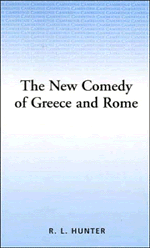5 - Comedy and tragedy
Published online by Cambridge University Press: 01 June 2011
Summary
The exploitation of tragic poetry for a wide variety of humorous effects is one of the most striking and memorable features of Aristophanic drama. New Comedy too made use of language and motifs borrowed from tragedy. As, however, virtually all the Greek tragedy which was written during the fourth and third centuries b.c. has perished and only fragments remain of the Latin adaptations of Greek tragedies with which the audiences of Plautus and Terence were familiar, we must resign ourselves to the fact that there is probably a great deal of ‘tragic exploitation’ in the extant comedies which we are unable fully to appreciate. Nevertheless, two important facts assist us in assessing this aspect of comic technique. The first is that, as part of the firm separation between the two genres in the Greek world, the linguistic and metrical practice of Greek tragedy is sharply distinguished from that of comedy, and so passages of elevated style in comedy can usually be identified even where the text does not specifically call attention to this feature in a character's speech. In Latin, unfortunately, identification of specifically tragic style is much less easy as neither the language (particularly in the time of Plautus) nor the metrical practice of comedy were differentiated from tragedy in the sharp Greek manner. It is reasonable to suppose that this difference is a result of the fact that, unlike their Greek counterparts, the earliest Latin adapters of Greek drama (Livius Andronicus, Gnaeus Naevius) wrote both tragedies and comedies.
- Type
- Chapter
- Information
- The New Comedy of Greece and Rome , pp. 114 - 136Publisher: Cambridge University PressPrint publication year: 1985



